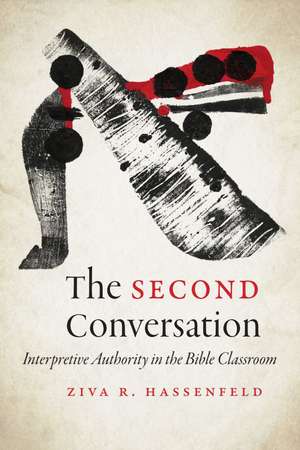The Second Conversation: Interpretive Authority in the Bible Classroom: Mandel-Brandeis Series in Jewish Education
Autor Ziva R. Hassenfelden Limba Engleză Paperback – 7 mar 2024
In The Second Conversation, university professor Ziva R. Hassenfeld returns to the middle school classroom to study her own seventh grade Bible class. The book explores dilemmas of practice she encountered around interpretive authority in the classroom. She analyzes the questions that came up in her teaching within the context of the most influential religious education scholarship, literacy scholarship, sociocultural theory and literary theory. She highlights the importance of two conversations about interpretive rules within the classroom, the first about the text’s meaning, and the second about competing conventions for determining its meaning. Instructors of any type of literature will benefit from Hassenfeld’s study, which offers rich ideas about when and how teachers enforce a classroom’s way of reading or follow a student’s line of inquiry toward more flexible interpretation.
Preț: 206.04 lei
Preț vechi: 249.42 lei
-17% Nou
Puncte Express: 309
Preț estimativ în valută:
39.42€ • 41.38$ • 32.72£
39.42€ • 41.38$ • 32.72£
Carte nepublicată încă
Doresc să fiu notificat când acest titlu va fi disponibil:
Se trimite...
Preluare comenzi: 021 569.72.76
Specificații
ISBN-13: 9781684581894
ISBN-10: 1684581893
Pagini: 166
Ilustrații: 1 figure
Dimensiuni: 152 x 229 x 18 mm
Greutate: 0.29 kg
Editura: Brandeis University Press
Colecția Brandeis University Press
Seria Mandel-Brandeis Series in Jewish Education
ISBN-10: 1684581893
Pagini: 166
Ilustrații: 1 figure
Dimensiuni: 152 x 229 x 18 mm
Greutate: 0.29 kg
Editura: Brandeis University Press
Colecția Brandeis University Press
Seria Mandel-Brandeis Series in Jewish Education
Notă biografică
Ziva R. Hassenfeld is the Jack, Joseph, and Morton Mandel Assistant Professor in Jewish Education at Brandeis University and assistant director of research for the Mandel Center.
Cuprins
Introduction
Chapter 1: My Hebrew Bible Classroom: The School, the Students, the Subject Matter, the Teacher, and the Research Agenda
Chapter 2: Creating a Classroom of Interpreters
Chapter 3: Stepping into My Students’ Scriptural Literacy Practices
Chapter 4: The First Conversation: Interpretive Rules in the Classroom
Chapter 5: The Second Conversation: Discussing Interpretive Rules in The Classroom
Conclusion: The Stakes of Knowing How to Have the Second Conversation
Bibliography
Methodological Appendices
Chapter 1: My Hebrew Bible Classroom: The School, the Students, the Subject Matter, the Teacher, and the Research Agenda
Chapter 2: Creating a Classroom of Interpreters
Chapter 3: Stepping into My Students’ Scriptural Literacy Practices
Chapter 4: The First Conversation: Interpretive Rules in the Classroom
Chapter 5: The Second Conversation: Discussing Interpretive Rules in The Classroom
Conclusion: The Stakes of Knowing How to Have the Second Conversation
Bibliography
Methodological Appendices
Recenzii
“. . . Providing students with the space to pursue an interesting train of thought while attempting to maintain established boundaries for interpreting the text, sets the stage for Hassenfeld’s exploration of the complexity of literacy, interpretation, and teaching. The book is an account of Hassenfeld’s research, but the narrative approach is particularly accessible, moving through a year of teaching at a K-8 Jewish Day School with a skillful blend of theoretical discussions, personal reflections, and classroom accounts.”
“With abiding respect for learners, teachers, and texts, Hassenfeld beautifully articulates a rarely addressed but deeply compelling problem of practice. The Second Conversation gets to the heart of teaching and learning and invites educators to join the author in a vital, field-building conversation about the meaning-making process itself—what is at stake and for whom. Serving as a model herself, Hassenfeld guides educators to become ever more intentional in shaping the communities of learning they envision.”
“The time for this book is now, a time in history when conversations in classrooms—religious and secular alike—are being restricted and debated. Playing at the intersections of theory and practice, Hassenfeld draws readers in from the very first words. This should be essential reading for literacy teachers and researchers alike.”
“How can classroom teachers notice and make visible for students the tacit interpretive rules guiding textual response processes? How can we invite students to intellectually question and compare sets of interpretive rules? Hassenfeld explores these questions through a beautifully crafted teacher narrative, infused with delight in the beauties and complexities of the Hebrew scriptural writing she teaches. This masterful book exemplifies how much literacy educators and scholars stand to learn from interdisciplinary inquiries in religious education. Read this book and be transformed!”




